Evaluating Country Programmes - OECD Online Bookshop
Evaluating Country Programmes - OECD Online Bookshop
Evaluating Country Programmes - OECD Online Bookshop
You also want an ePaper? Increase the reach of your titles
YUMPU automatically turns print PDFs into web optimized ePapers that Google loves.
<strong>OECD</strong> 1999<br />
French Experience with <strong>Country</strong> Programme Evaluations<br />
have been finalised, and increase the involvement of the administration’s technical<br />
bodies. Demand remains high, and is routinely based on a quantitative assessment<br />
of aid, extended to encompass all French co-operation players in a country.<br />
CPEs also provide an opportunity to identify more targeted evaluation needs,<br />
such as project and sector evaluations, for which the CPE can constitute an important<br />
benchmark. CPEs and other types of evaluation have become increasingly<br />
interlinked. Project and/or sectoral evaluations can fuel a CPE, which can itself identify<br />
a need for a more specific project or sector evaluation.<br />
In addition, the existence of more than one CPE can result in sectoral evaluations<br />
and inter-country or intra-zone instruments being undertaken. CPEs allow the<br />
scope of strategic analysis to be broadened.<br />
The DAC criteria have proved very useful, although their application (impact,<br />
in particular) is more difficult in the area of CPEs than in project and programme<br />
evaluations.<br />
The main preoccupation of evaluators is usually the relevance of co-operation<br />
actions. This concept is put into perspective in relation to partner country expectations<br />
and needs, and to French co-operation objectives, both stated and implicit.<br />
Coherence is applicable on an “internal” and “external” basis, since links<br />
between the various forms of intervention by the French Ministry of Co-operation<br />
need to be examined, as does co-ordination among the various bilateral and multilateral<br />
lenders. This latter point is regularly underlined, often in connection with<br />
its weakness.<br />
Effectiveness and efficiency are assessed by studying projects and programmes.<br />
It is difficult to examine co-operation policy from the point of view of<br />
these criteria. The same is true with regard to quality. However, these criteria can<br />
be assessed by examining co-operation instruments (technical assistance, expert<br />
missions, funding, operators, etc.), and are useful when formulating general recommendations<br />
on intervention methods.<br />
Evaluators routinely consider the partnership aspect. Support for institutional<br />
development has become a focal point of the French Ministry of Co-operation, at<br />
both central and decentralised levels, in a governmental perspective and for the<br />
greater good of society. This is where the criteria of efficiency and viability or sustainability<br />
assume their full importance.<br />
How are CPEs findings taken into account by beneficiary countries and donors<br />
in adjusting development strategies and donor-supported programmes?<br />
The reporting and feedback effect mechanism is based on a number of simple<br />
principles, but is not standardised, because it must be tailored to the context and<br />
177






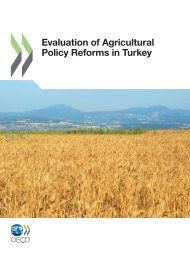
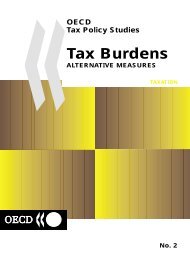

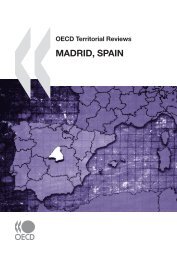




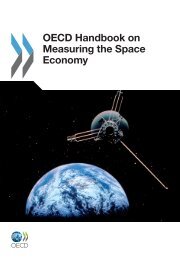
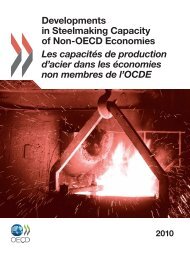

![CQE=U]^\]Z: KAZAKHSTAN - OECD Online Bookshop](https://img.yumpu.com/3915768/1/190x253/cqeuz-kazakhstan-oecd-online-bookshop.jpg?quality=85)